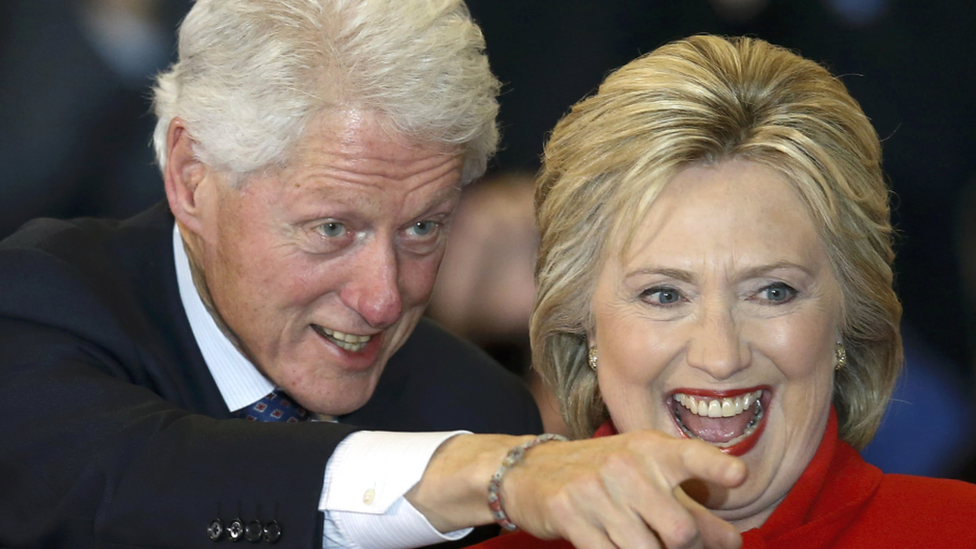Good Friday Agreement: Bill Clinton says getting involved was 'leap of faith'
- Published
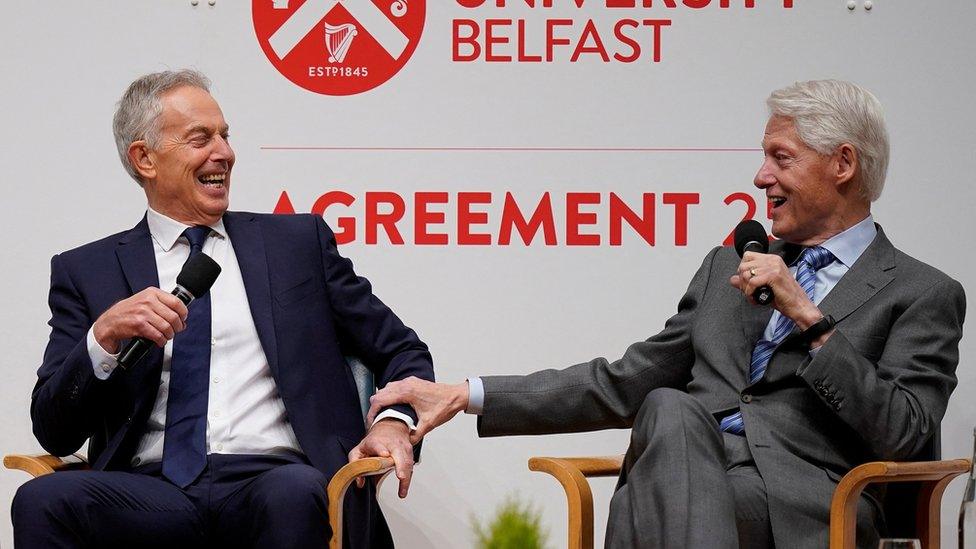
Sir Tony Blair and Bill Clinton share a joke during the Good Friday Agreement event
Former US president Bill Clinton has said his decision to become involved in the Northern Ireland peace process was a "leap of faith".
Mr Clinton was speaking at an event in Belfast to the 25th anniversary of the Good Friday Agreement.
He was on a panel with Sir Tony Blair and former taoiseach Bertie Ahern.
"We'd like to tell you that we had it all thought through, but the truth is we made up a lot of it as we went along," the former president said.
"We had to wing it."
Mr Clinton also said his Irish-American advisers warned him about the political price he could pay for appointing a special US envoy to Northern Ireland in the early 1990s.
"They told me: 'You have no idea how hard it is going to be for you to keep this commitment. People will think you're insane'," Mr Clinton said.
"The State Department had operated for decades under a theory that our relationship with the UK was so important we couldn't mess it up."
The agreement, signed on 10 April 1998, was designed to bring an end to the Troubles and established power-sharing institutions at Stormont that involved nationalists and unionists governing Northern Ireland together.
'Sign of strength'
The three-day Agreement 25 conference at Queen's University Belfast is hosting many global figures, including Mr Clinton and his wife Hillary.
Earlier, former US senator George Mitchell called on political parties in Northern Ireland to compromise to keep the peace and resolve the Stormont impasse.
Mr Mitchell chaired the talks that led to the Good Friday Agreement,
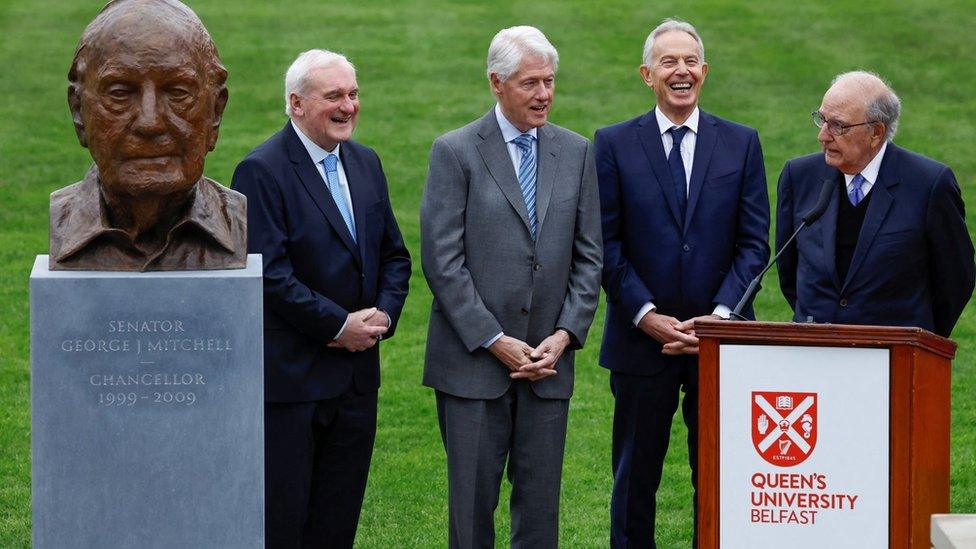
A bust of US Senator George Mitchell was revealed as part of the Good Friday Agreement anniversary event in Belfast
He said people were still wrestling with their doubts and disagreements, but the deal had set an example for peace around the world and urged people not to let it "slip away".
"It is not a sign of weakness to resolve your differences by democratic and peaceful means," he said.
"To the contrary, it is a sign of strength and of wisdom, and it clearly reflects the will of the overwhelming majority of the people of Northern Ireland."
Senator Mitchell called on the people of Northern Ireland not to give up on their belief the future could be better.
He also urged the current political leaders to act with the "courage and wisdom" that their predecessors had done.
Northern Ireland is currently without a power-sharing government.
Its second-largest party, the Democratic Unionist Party (DUP), pulled out of the executive in February 2022 in protest against the Northern Ireland Protocol - the trade arrangements for Northern Ireland that resulted from the original Brexit deal between the UK and the EU.
Former US senator George Mitchell addresses peace event
Opening the conference, Hillary Clinton said the Good Friday Agreement was a triumph of diplomacy and a testament to democracy.
The former US secretary of state, who is chancellor of Queen's University, said the credit for peace ultimately went to the brave people of Northern Ireland who took risks.
'Collective spirit'
Sir Tony Blair recalled the final week of the talks when he and Mr Ahern went to Belfast, even though the taoiseach's mother had just died.
"He took lots of abuse during the course of this process - people would come and be really rude to him," Blair says of Ahern.
"I got offended on his behalf, but he was never really offended."
He said the negotiations were a rollercoaster, and the world's media camped outside Castle Buildings where negotiations were taking place added to the pressure the negotiators felt.
"As we carried on through the days and nights, there came a strange collective spirit of: 'Well we can't go out there and say it didn't work.'"
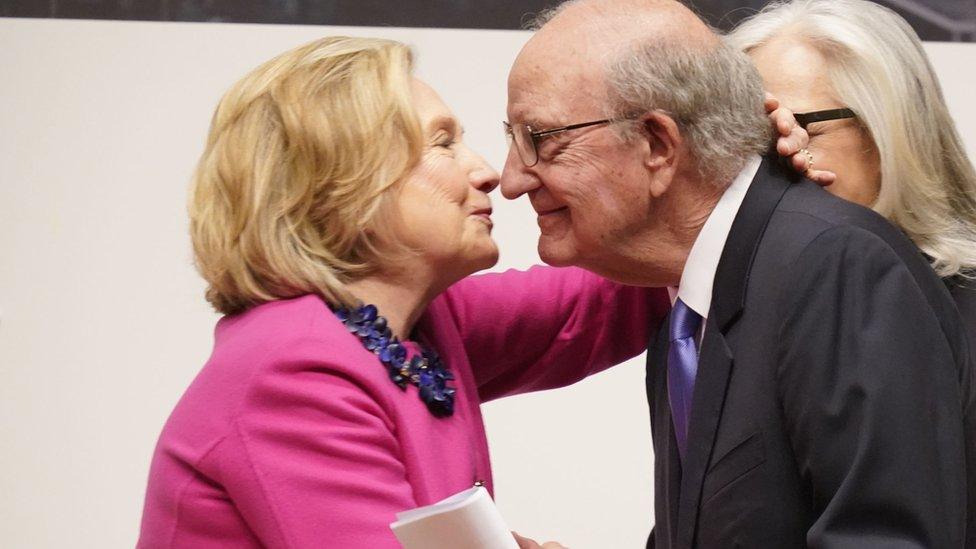
Hillary Clinton and George Mitchell shared the stage on the first day of the conference to mark 25 years since the Good Friday Agreement
At Monday's event, Mr Ahern called on the the DUP "to stay the road with us".
"The people of Northern Ireland need them, the people on this island need them," he said.
Recalling the talks leading up to the agreement, Mr Ahern said "the issues were huge" and that dealing with the constitutional issues on both sides was a massive undertaking.
He praised Mr Blair made saying "they were big calls and you did a good job on them".

What is the Good Friday Agreement?
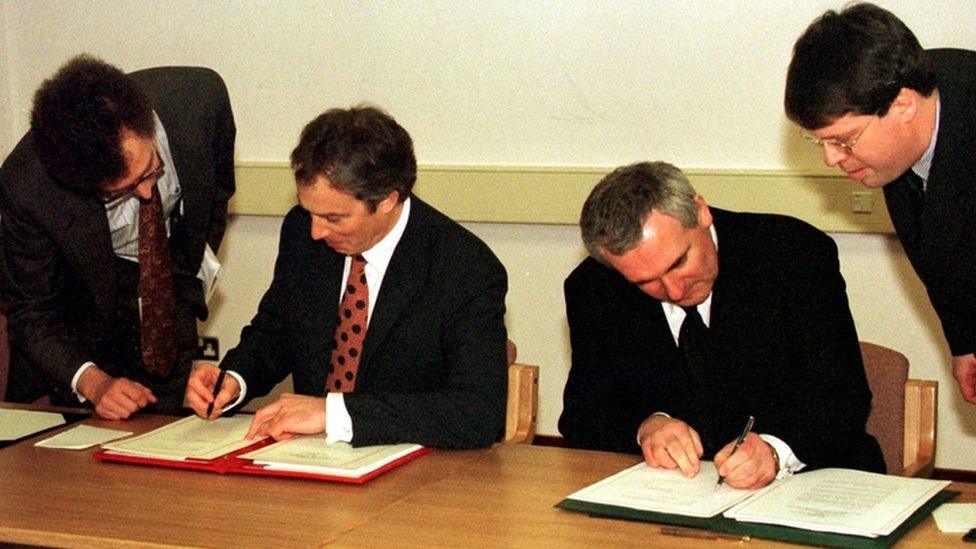
The prime minister at the time, Tony Blair, and then Taoiseach (Irish Prime Minister) Bertie Ahern sign the Good Friday Agreement
Also known as the Belfast Agreement, it was a political deal designed to bring an end to 30 years of violent conflict known as the Troubles.
Signed on 10 April 1998 and approved by public votes in Northern Ireland and the Republic of Ireland, it is based on the idea of co-operation between communities.
It helped to set up a new government for Northern Ireland, representing both nationalists and unionists.
Read more: What is the Good Friday Agreement?

Last week US President Joe Biden visited the island of Ireland over four days to mark the 25th anniversary of the agreement.
He hailed the "tremendous progress" since the deal was signed, adding that Northern Ireland had been "transformed by peace; made technicolour by peace; made whole by peace".
Prime Minister Rishi Sunak will also be in Northern Ireland this week, to pay tribute to the contribution young people have made to peace.
Among those events will be a gala dinner to honour those who signed the deal.
Mr Sunak said he was due to meet some of the leading architects behind the peace agreement.
He will acknowledge their "courage, imagination and perseverance" when he gives the closing speech at the conference.

Read more about the agreement
EXPLAINER: What is the agreement?
ANALYSIS: Is it still fit for purpose?
REFLECTION: The 'bitter' price of peace


Declan Harvey and Tara Mills explore the text of the Good Friday Agreement, scrutinising the deal's wording and hearing from some of the people who helped get it across the line.
Click here to listen on BBC Sounds.

- Published10 April 2023
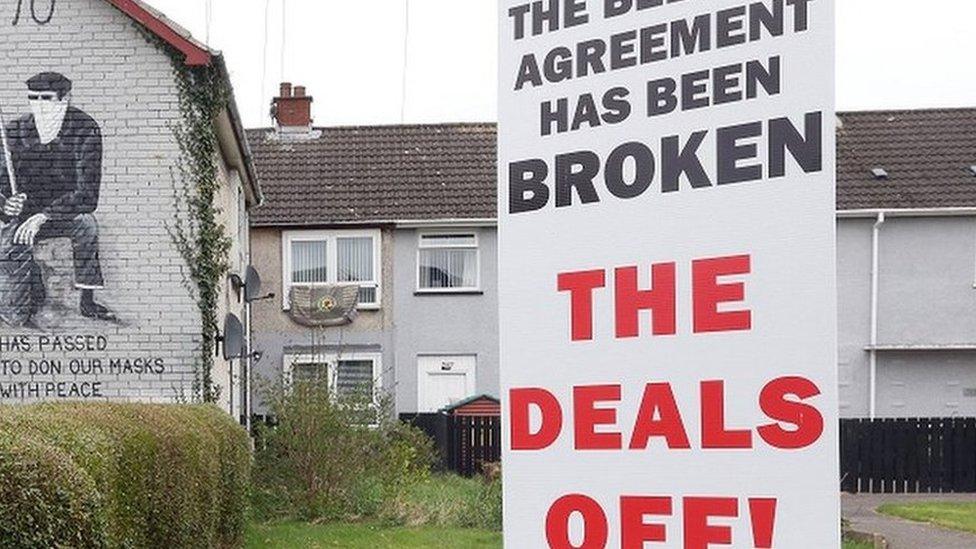
- Published16 April 2023
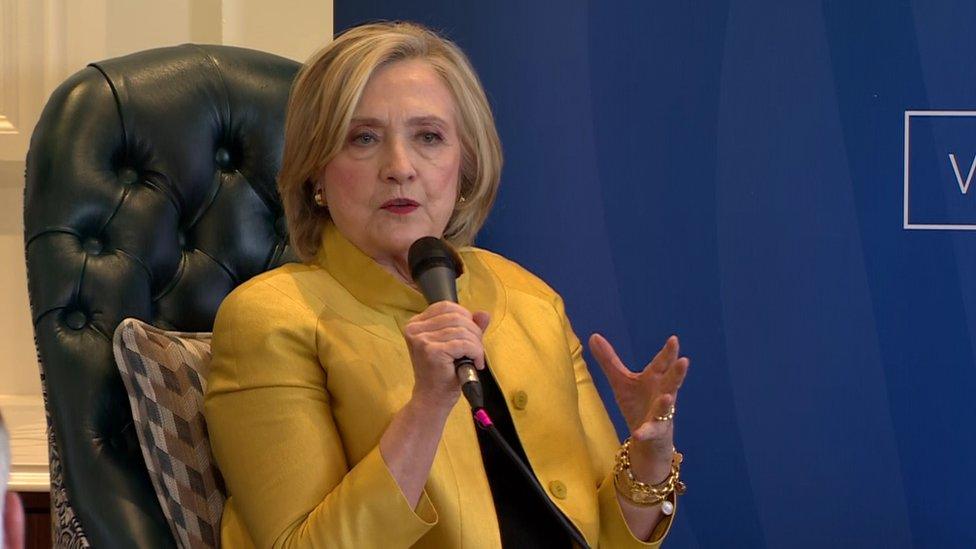
- Published16 April 2023
